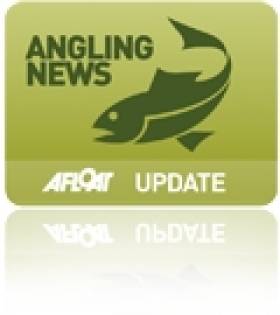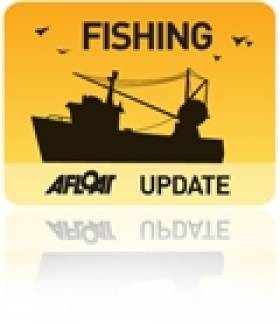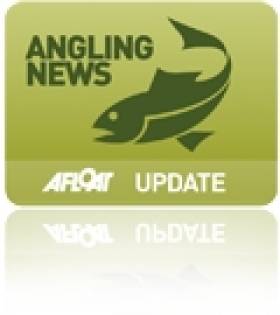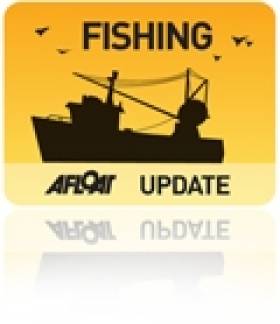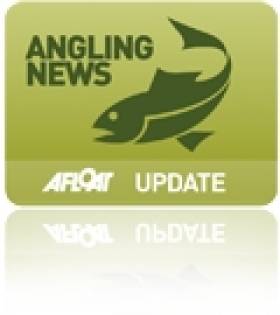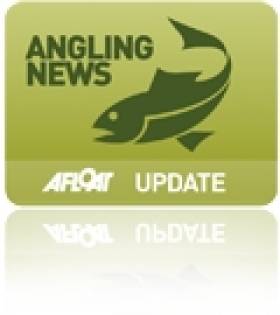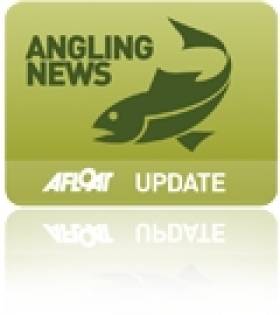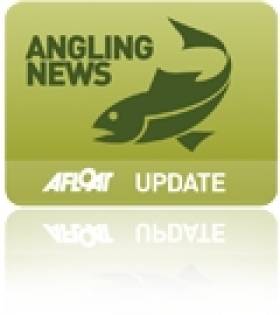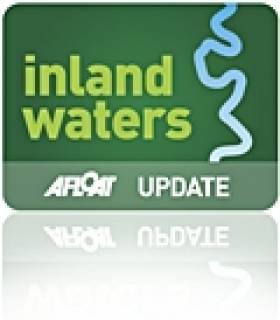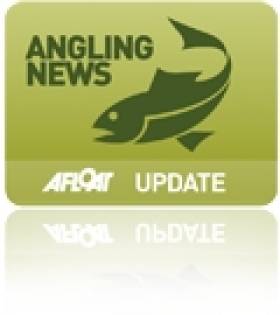Displaying items by tag: Salmon
Minister Opens White River Fishery Enhancement Project
#ANGLING - Minister of State Fergus O'Dowd was on hand at the opening of the White River enhancement project in Dunleer, Co Louth earlier this month.
The €32,000 project was funded by the Louth Leader Partnership, with works were carried out by the Dee and Glyde Fishing Development Association and the Dundalk district staff of Inland Fisheries Ireland.
The White River, a tributary of the River Dee, is considered hugely important as a spawning and nursery area, and it has already seen significant improvements in the levels of juvenile salmon and trout.
Instream enhancement works began in 2006, supervised by Inland Fisheries Ireland, and included the introduction of new gravel, weirs, deflectors and spawning beds which have helped the White River to achieve its potential in terms of fish numbers.
Speaking at the launch, Inland Fisheries Ireland CEO Dr Ciaran Byrne said: "The work that I have seen on the river is fantastic and a credit to all involved."
IFI assistant inspector in Dundalk, Ronan O’Brien, said project was based on restoring the natural features of the river.
He added that the programme was a great recognition of the work carried out by the Dee and Glyde Fishing Association, and that it had strengthened links with local business and development groups and could be used as a template for other projects in the area.
Cumbrians Urged to Try New Fish to Save Irish Sea Stocks
#FISHING - Seafood lovers of Cumbria in north-west England have been urged to broaden their tastes to save depleted stocks of their favourite fish in the Irish Sea.
According to the News & Star, some 80% of Britons "insist upon eating just five types of fish – cod, tuna, salmon, prawn and haddock."
But the Cumbria Wildlife Trust says that with coastal waters facing the serious threat of overfishing, a rethink is needed among both consumers and suppliers alike.
“The Irish Sea has a wide range of edible fish species but you wouldn’t know it judging by the fish counters in supermarkets across the county," says Lindsay Sullivan of the trust's Wild Oceans project, an 18-month scheme that hopes to "turn the tide for seafood".
A big part of this is encouraging consumers to skip the usual white fish and try different species such as flounder, monkfish and red mulllet, creating demand for cheaper and more sustainable fishing.
The News & Star has more on the story HERE.
IFI Launches 2012 Sponsorship Programme
#ANGLING - Inland Fisheries Ireland (IFI) has announced the launch of its 2012 Sponsorship Programme.
The IFI Sponsorship Programme aims to increase awareness of IFI and its work, recreational angling, the sustainable commercial use of the inland fisheries resource and habitat issues.
Applications are invited from organisers and event promoters that will support the aims of the IFI sponsorship programme.
Events would be supported on the basis of: the location and nature of the event; the potential of the event to introduce new users to angling in an active capacity (ie not just as spectators); and to educate and inform stakeholders of angling, environmental, commercial salmon fisheries and habitat issues.
"The sustainable use of our wonderful inland fisheries and sea angling resources must be promoted," said Minister for Communications, Energy and Natural Resources, Pat Rabbitte, who launched the programme.
"People of all ages can enjoy angling in urban and rural settings, off charter boats and beaches and on quiet riversides.
"In addition, traditional commercial fisheries add value to small local communities, while biodiversity awareness ensures a sustainable resource for all."
Applications and details of the sponsorship programme are available online or from your local IFI office. The closing date for submissions is 27 January 2012.
Wild Salmon Showing Signs of Adapting to Climate Change
New evidence is indicating that wild salmon are adapting to climate change by feeding in colder waters, The Irish Times reports.
According to salmon expert Dr Ken Whelan, wild salmon are now diving as far as 800m below the surface - normally the preserve of the sperm whale - to feed for periods of up to 24 hours during winter months.
They are also travelling closer to the polar ice fields, in response to the warming of the Atlantic Ocean.
The change in behaviour was noted at a salmon summit in France attended by more than 100 fishery managers and scientists from across Europe, which was convened to discuss the threat of climate change to wild salmon stocks at sea.
Plankton levels are particularly affected by the changing wind and ocean currents, said Dr Whelan of findings from the EU-funded Salsea programme, which he led.
“Surviving the first winter at sea seems to be the key challenge for these stocks, and the salmon in the northern states like Norway and Russia, seems to be less affected,” he said.
But the recent return of wild salmon to the Tolka in Dublin, as well as healthy numbers along other inland waterways, highlighted that the news was not all doom and gloom.
The Irish Times has more on the story HERE.
Atlantic Salmon on 'Red List' of Endangered Species
Atlantic salmon have joined four other native fish on a 'red list' of endangered species compiled by the Ireland's fisheries and wildlife agencies.
As the Irish Independent reports, one third of the State's 15 native fish species are considered endangered or vulnerable.
One of the worst hit is the European eel, which was found to be critically endangered.
In a report published yesterday, a number of threats were highlighted such as water pollution, invasive species, overfishing, poor river management and climate change.
According to The Irish Times, the Red List was compiled by scientists from organisations across the island including Inland Fisheries Ireland, the National Parks and Wildlife Service, the Northern Ireland Environment Agency and the National Biodiversity Data Centre.
The news comes just a few days after Dublin celebrated the return of wild Atlantic salmon to the River Tolka after more than a century.
The Irish Times has more on the story HERE.
Salmon Return to the Tolka After More Than a Century
Dublin has yet another thing to celebrate with the news that wild Atlantic salmon have returned to what was long regarded as the dirtiest of the capital's inland waterways.
The Irish Independent reports that the fish have been spotted along the banks of the Tolka between Glasnevin and Finglas for the first time in at least 100 years.
Efforts to clean the river in recent years, as well as the removal of man-made weirs, are thought to have aided the recovery of the Tolka, which now provides plentiful nutrients for migratory fish.
Atlantic salmon in particular are considered by scientists to be a 'bio-indicator' in that they require a very high standard of water, so their presence in a given area defines it as a healthy environment.
The Tolka joins the Liffey and the Dodder in the list of Dublin rivers hosting thriving stocks of young fry in what has been a bumper year for salmon angling across the country.
The Irish Independent has more on the story HERE.
Welcome Boon for the River Moy
The New York Times recently paid a visit to the River Moy in Co Sligo, where angling has experienced a resurgance in recent years.
Since the ban on drift netting off Irish shores in 2007, salmon numbers in the Moy have risen to 75,000 annually, according to Inland Fisheries Ireland.
It's a welcome boon for the River Moy, which also suffered the effects of dregding for agricultural purposes in the 1960s which "cripped much of the integrity of the river’s substrata away, creating the equivalent of a featureless canal through much of its course."
Weirs and spawning gravel in tributary streams have helped the Moy to recover some of its former glory, and the river now welcomes thousands of anglers each year - especially to the top spots in Ballina town centre.
The New York Times has more on the story HERE.
Go Fishing in Ireland - an 'Angler's Paradise'
DiscoverIreland guest blogger Kirsten Fruit has posted a quick guide highlighting Ireland's abundance of world-class angling spots.
"For years, fishing fanatics from around the world have found a haven of sorts in Ireland’s waterways," she writes, "and it isn’t hard to see why."
Ireland has it all, from deep-sea angling for bass or cod to trout or salmon fishing on rivers and lakes.
But it's not just for the experts, as there are many excellent angling guides throughout the country who make a business out of introducing newcomers to the sport.
"Having a guide adds 100 percent to an individual’s enjoyment on the river," says Ballynahinch Castle's master ghillie Simon Ashe.
DiscoverIreland has more on the story, including guides' favourite angling spots, HERE.
Fisheries Funding for Salmon Recovery Projects
Some 17 projects have been approved for funding under the Salmon Conservation Fund, The Irish Times reports.
The pilot scheme by Inland Fisheries Ireland is designed to help angling clubs and fishery owners restore salmon stocks in Ireland's rivers.
The successful applicants across 11 counties will receive a share from more than €120,000 derived from salmon licence-holder contributions.
Accepted projects include spawning enhancement, bank protection, fish passage and habitat improvement. Priority was given to rivers below conservation limits.
The Irish Times has more on the story HERE.
Eddie Lands Specimen Salmon
Eddie O'Connor (left of image) of Dublin caught this magnificent specimen spring salmon of 9.2kg (20lbs 4oz) at Foxford fishery on the Moy in late May. Foxford fishery ghillie Vincent McDonnell is pictured right.



























